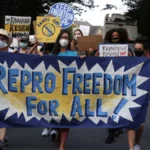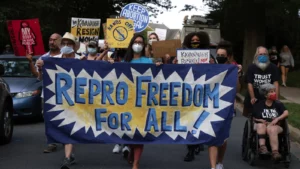Fighting for Our Lives in the Draft Aftermath of Roe

 I have not (yet) been raped. Unlike most women my age (not quite 50), unlike nearly every adult woman I know, I have never experienced unwanted sexual touch from a man.
I have not (yet) been raped. Unlike most women my age (not quite 50), unlike nearly every adult woman I know, I have never experienced unwanted sexual touch from a man.
I’ve never had a pregnancy scare. I don’t date men—I’m a lesbian who has been in the same committed relationship since 1996—and the one boyfriend I had in high school was a committed feminist who was ridiculously patient with my sexual confusion and astonishingly respectful about the mixed messages emerging from my adolescent curiosity about desire.
I’ve been pregnant once and have one child. I’ve never had an abortion. I’ve never even had a miscarriage.
But I have spent many hours outside the doors of abortion clinics, starting with my senior year of high school, when I woke up early every Saturday and drove downtown to the nonprofit abortion clinic to stand between protestors and the patients they were haranguing.
The clinic was on a busy city street; there was no shielded entrance. Whether they came by bus or by car, patients had to use the city sidewalk to get to the door. That meant walking through a cluster of protestors who were begging people not to go in, chanting at the patients to change their minds, telling them they were murderers, harlots, fools who were making the biggest mistake of their lives.
The term “clinic defense” evokes walls or weapons or medieval barricades, but of course showing up in support of the patients and the clinic involved none of those things. What did it involve? We stood so that our bodies blocked the view of the protestors’ graphic signs (you’ve probably seen the ones I mean, those vastly enlarged images of a late-term fetus, with heart-wrenching captions written from the fetus’s imagined point of view). We stepped between the protestors and the patients. We told the patients good morning and hello. We made eye contact. We smiled. If anyone looked particularly freaked out, we offered to walk them to the door.
Every week, there were stretches of time when no one was walking in or out. We’d stand around on the sidewalk, the clinic defense team chatting, the protestors praying and singing. It was pretty much the same core group of people on both sides who came out every weekend; over time we got to know each other’s faces. Sometimes, with no patients available, the protestors would work on us. They would walk up to us, ask us to justify our positions, explain to us why we had it all wrong.
One time, an older white man approached me and two other teen girls who were weekend regulars to lecture us about the dangers of getting drawn into Satanic lesbianism. “I know you’re here because you’re lesbians,” he told us, and then five minutes later told us that he knew we were pro-choice because we wanted license to be promiscuous. None of us bothered to point out to him that promiscuous lesbians are unlikely to need abortions to support their sexual license.
Other protestors approached us because we were the youngest there, the most easily swayed, near-children who must have been misled. They witnessed to us with a deep earnestness that was matched only by the depths of our teenage sarcasm. I remember one woman handing us cartoon Chick tracts, which we took so as not to be rude. “We’re Jewish,” two of us told her. Undeterred, she told us to just look at the tract. In a tone somewhere between a dare and a plea, she urged us to turn to the back and read aloud the words printed there. “If you just say those words out loud, you will be saved.” One of the girls took her up on it, pronounced aloud the pledge to accept Jesus as her savior, and then said, flat as Morales in A Chorus Line, “Nope. I felt nothing. Still Jewish. Still pro-choice.”
Coming of age in the early 1990s, when one Supreme Court decision after another narrowed access to abortion each year I was in high school, from Webster (viability), to Hodgson (parental notification), to Rust v. Sullivan (gag rule) to Planned Parenthood v. Casey (undue burden), when fundamentalist Christian protestors besieged abortion clinics and called it mercy, while their fringe terrorist vanguard assassinated doctors, my experience of the abortion issue was so deeply political, and the motivations of the abortion opponents I’d encountered so clearly religious, that it was initially surprising to me to learn, decades later, that abortion opposition did not start out as a Republican issue, and that opposition to abortion itself was not even the motivating factor behind the anti-abortion politics of either the Republican Party or the organized evangelical movement.
What was the initial cause that drove the evangelical Christian movement into using abortion as a springboard for enshrining their religion in national politics? Racial segregation. Specifically, major figures in the white evangelical movement wanted to maintain the ability to run educational institutions that prohibited admission to Black people—and to get tax exemptions for it, civil rights laws be damned. But even in the late 1970s, rallying around segregation academies wasn’t a good look.
So, as historian Randall Balmer and documentarians Annie Sundberg and Ricki Stern have demonstrated, the white religious right seized on abortion (previously seen as morally neutral among even the most conservative Protestant denominations) as a moral wrong that could drive people to the polls. Defense of segregation academies, not of the “preborn,” was what first caused the religious right to throw their political weight behind the governor from California, instead of the evangelical incumbent president from the Bible Belt. Abortion was just the slingshot they used to throw it.
Now, with Roe v. Wade on the brink of being overturned, it’s easier to unwind these tangled threads and track more clearly where they’ve been leading all along. Christian theocracy is at the doorstep. Reversing Roe will produce even more Black and Brown death and more poverty, conditions that benefit the very corporate interests that sold us the modern idea of the Christian nation as a way to oppose the godless socialism of the New Deal. (Hat tip to historian Kevin M. Kruse for exploding that mythos.)
It’s not just the right to an abortion that is under attack. Supreme Court Justices and conservative lawmakers and strategists have signaled that birth control, same-sex marriage, interracial marriage, non-heterosexual sex, and universal public education are all fair game for re-evaluation by a right-wing court. Revanchist white Christian nationalist politics threaten bodily autonomy for women, trans people of all ages, and children of all genders, along with assailing voting rights and the living conditions of workers, poor people, immigrants, and, as always, Indigenous people, Black people, and other people of color. The white Christian right is targeting public schools as sites of “grooming,” “critical race theory,” and social emotional learning—or, put another way, as sites of critical inquiry and empathy, those twin nemeses of authoritarianism.
We can see the end game: Freedom to discriminate for the few and powerful, self-determination curtailed for the rest of us, public schools eroded, more money for vouchers (neatly restoring public funding for private religious institutions). In sum, a vast dismantling of the social and civil underpinnings needed to build a multiracial democracy free from a hierarchy of human worth.
Abortion has been considered a single-issue fight for decades. Political parties have used abortion as a wedge issue and courted what the media and strategists alike have termed “single-issue voters” to solidify power. But the truth is, the political struggle over abortion has never actually been a single-issue fight. As much as it’s been about patriarchy and the domination of certain child-bearing bodies, the anti-abortion movement has been fueled by the drive to use the abortion issue to achieve a slew of right-wing goals that run the gamut from cultural to economic.
In the week after the leak of Alito’s draft opinion striking down Roe, my social media feeds, like those of many on the left, were filled with a back-and-forth about whether it’s appropriate to jump into the implications of which rights are on the chopping block next, or whether it’s essential to take the time to focus on the imminent threat to Roe. But acknowledging the big picture is not the same as moving on from the battle around the end of Roe “too soon.” It’s a matter of paying attention to what’s always been happening with the threat to abortion justice.
We are in a fight against a white Christian nationalist vision of this country. It’s important to name it—and to act like it. This is a fight against a powerful partnership between religious extremists and the perpetrators of a class war that threatens all but the very richest (and ultimately even the very richest, too, as the climate encompasses us all). It’s a fight for the sovereignty of every person who may ever have an abortion, yes. But it’s also a much bigger fight for the value inherent in every single one of our lives.
I find myself wondering about the people who stood out on that sidewalk every Saturday over thirty years ago, with their protest signs and gospel tracts. It’s been a long time; some of them were already elderly. But those who are still here, I wonder what they’re feeling these days. Is it triumph? Is it fear of a world changing too fast under their feet? Are they still out in front of clinics or are they at school board meetings now, shouting down librarians?
There’s a part of me that longs to turn the tables, to be the one who walks right up to them and says, I wasn’t being fooled out there, but you were. To be the one with the set of magic words that could make them see how a force much bigger than themselves took their private religious convictions and exploited them, cynically and skillfully, to build a multigenerational campaign for a sweeping political agenda that is fundamentally disrespectful of life.
But they’d never listen to me. So instead, I’m talking to you. Because the solidarity required to bring us into the next moment will need to be as broad and as steadfast as the ambitions of the opposition that brought us to this one.